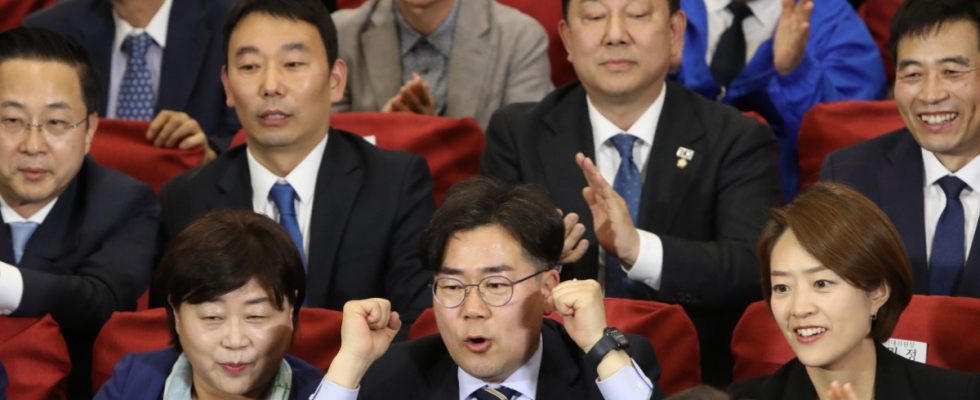South Korean President Yoon Suk-yeol was initially not visible the day after his conservative People Power Party (PPP) suffered a heavy election defeat. Presidential Office Chief Lee Kwan-seop chaired the review press conference and only addressed Yoon’s comment.
“I will humbly accept the will of the people expressed in the general election, and strive to reform the administration and do my best to stabilize the economy and improve the living conditions of the people,” he said President said, Lee said.
Important PPP politicians are already drawing conclusions
The quote seems a bit otherworldly when you consider the result that the news agency Yonhap reported on Thursday afternoon: Together with its satellite party, the PPP only won 108 of the 300 seats in the National Assembly, while the liberal Democratic Party (DP) and its satellite party won 175 seats. The new liberal alternative Rebuilding Korea Party (RKP) of the polarizing former Justice Minister Cho Kuk is the third strongest party with twelve seats.
If you include the gains of smaller parties, Yoon Suk-yeol will have to play politics in the future against a huge opposition with over 190 seats. Under these circumstances, he can hardly change anything sustainably on his own.
Others in government seemed to understand the numbers better. As the presidential office announced, three senior presidential aides – including Lee Kwan-seop himself – offered to resign. Vice Prime Minister Han Duck-soo also did this. And in the PPP, party leader Han Dong-hoon made his post available.
Yoon can now almost only issue presidential decrees and block the opposition
Advocates of democracy and social progress have recently looked at South Korea with concern. Ex-prosecutor Yoon’s style of government was so characterized by power words and complaints against striking workers, journalists and opposition politicians that they thought the tiger state was halfway back to the bad old days under authoritarian leadership. Only a few weeks ago that counted Swedish research institute V-Dem South Korea is one of the “autocratizing countries”. But Wednesday’s election results show that South Korea’s democracy can fight back.
Voter turnout was higher than it had been in 32 years. 67 percent of the approximately 44 million eligible voters cast their votes, and their verdict has consequences for Yoon. He still has three years in office before the law requires a new president to be elected in 2027. But just like in the first two years since he took office in May 2022, Yoon can’t do much more in these three years than issue presidential decrees and use his veto power to block opposition projects.
Yoon Suk-yeol has already rejected nine DP bills, including the one that would enable a special investigation into allegations of stock manipulation against Yoon’s wife Kim Keon-hee. At the same time, he was unable to push through his own initiatives, such as the abolition of capital gains tax. This is how it will continue. “And because of the defeat, the ruling party will have to reevaluate its relationship with the president,” adds Cho Jin-man of Duksung Women’s University in the Korea Times.
Despite allegations of corruption, the liberal party leaders are the better alternative for many
There were moments of distance between the president and his party during the election campaign. With good humor and warnings about the scandal-ridden opposition leaders, the PPP seemed to want to distract from Yoon’s unwillingness to compromise. Above all, this led to a dead end in his dispute with the medical profession over more medical study places. A doctors’ strike has been affecting the healthcare system since February – so much so that emergency patients have already died, as Vice Prime Minister Han Duck-soo said in an interview with on Sunday Korea Times said. Yoon explained his stubbornness in a long speech, after which PPP leader Han Dong-hoon said on a campaign stage: “The government may not meet your expectations, but that’s not my fault.”
It was of no use. Now the leaders of the liberal forces are triumphing. DP leader Lee Jae-myung had promoted election day as “Doomsday.” When he won his constituency in Incheon, west of Seoul, he refrained from shouting victory. He basically just said that he would “lead South Korea back into the future,” which, as things stand, he can only do with power if he runs in the 2027 presidential election and doesn’t narrowly lose again like he did in 2022.
For the RKP, Cho Kuk, the real idol of the liberals in South Korea, said: “The people have made clear their intention to pass judgment on the Yoon government.”
The message of this election was that no matter what Lee and Cho have done, they are still better than Yoon. After their victories, Lee Jae-myung and Cho Kuk cannot look to the near future without any worries. Both are facing various corruption allegations in court proceedings. Outcome uncertain. The political situation in South Korea remains complicated.

